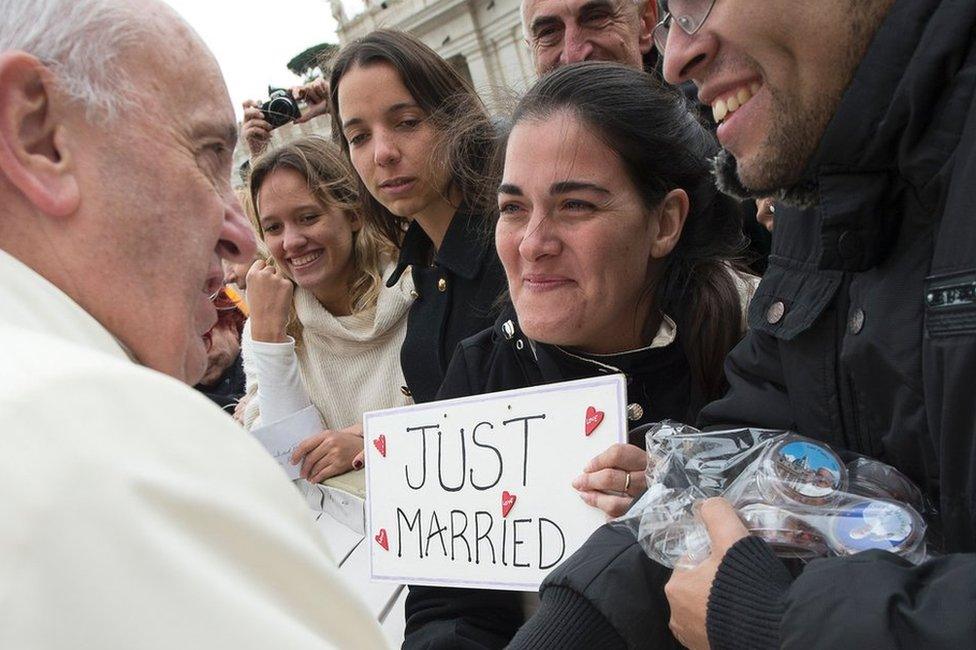Catholic Church: Pope Francis urges greater family understanding
- Published
- comments

Pope Francis greeted this newly married couple at the Vatican last month
Pope Francis has published new guidelines on family life that argue the Church should show more understanding of modern realities.
The document, external, based on two Synods on the issue, was eagerly awaited by the world's 1.3bn Roman Catholics.
Entitled "The Joy of Love", it does not change Catholic doctrine.
But it opens the way for bishops in each country to interpret doctrine to suit their own culture, the BBC's religion correspondent reports.
Pope Francis urges priests to exercise careful discernment over "wounded families" and be merciful, rather than judgemental.
He criticises the individualism that has led many in the West to value their own personal satisfaction over the needs of their spouse.
While saying yes to sex education, he argues it must be within a framework of education about love.
The emphasis throughout is on better pastoral care: better preparation for couples on what marriage involves, and more understanding from parish priests and others for human frailty.

What the document says about...
Divorcees remarrying: "Language or conduct that might lead them to feel discriminated against should be avoided, and they should be encouraged to participate in the life of the community. The Christian community's care of such persons is not to be considered a weakening of its faith and testimony to the indissolubility of marriage..."
Contraception: "The use of methods based on the 'laws of nature and the incidence of fertility' are to be promoted, since 'these methods respect the bodies of the spouses, encourage tenderness between them and favour the education of an authentic freedom'
Women: "The verbal, physical, and sexual violence that women endure in some marriages contradicts the very nature of the conjugal union. I think of the reprehensible genital mutilation of women practised in some cultures, but also of their lack of equal access to dignified work and roles of decision-making"
Sex education: "Frequently, sex education deals primarily with 'protection' through the practice of 'safe sex'. Such expressions convey a negative attitude towards the natural procreative finality of sexuality, as if an eventual child were an enemy to be protected against.... It is always irresponsible to invite adolescents to toy with their bodies and their desires, as if they possessed the maturity, values, mutual commitment and goals proper to marriage. They end up being blithely encouraged to use other persons as a means of fulfilling their needs or limitations"
Gay people: "Every person, regardless of sexual orientation, ought to be respected in his or her dignity and treated with consideration... As for proposals to place unions between homosexual persons on the same level as marriage, there are absolutely no grounds for considering homosexual unions to be in any way similar or even remotely analogous to God's plan for marriage and family"

The document is the culmination of three years' work by the Pope, who sent a questionnaire to families across the world asking them about their hopes and their fears.
He then brought bishops and cardinals together for two Synods in Rome, at which he encouraged them to debate and even to disagree over issues that divide the Church in many countries.
Among the most divisive issues are offering communion to the divorced and remarried, contraception and the treatment of gay Catholics.
Our correspondent, Caroline Wyatt, says the lengthy document shows exactly where Pope Francis stands as he steps into the minefield of Catholic teaching on the family.

Opening the way: analysis by Caroline Wyatt, BBC religion correspondent

This Papal exhortation treads a careful path. It reflects the debate between bishops and cardinals from across the world at both Synods held in Rome over the past two years.
The Pope has not changed Catholic doctrine, as some had hoped, but he does open the way for greater devolution within the Catholic Church on issues such as communion for divorced and civilly remarried Catholics.
What he suggests is that bishops in each country can seek solutions best suited to their own culture, and he calls for better integration into the Church of those in what he calls "irregular" situations.
Traditionalists, though, are likely to say that Pope Francis is opening the door to chaos in the future by suggesting that a "one size fits all" Church is not the way forward. Likewise, some liberals will be bitterly disappointed that there is not a greater welcome for gay Catholics - something Pope Francis was never likely to deliver.

Liberals had hoped he would tell the Church to show a more merciful attitude to those whose families do not conform to the current Catholic ideal.
Conservatives had maintained it would devalue the principle established by Jesus of marriage being indissoluble.
At the conclusion of the Synod last year, Francis castigated Church leaders who, he said, buried their heads in the sand over the issue. He argued that their adherence to rigid doctrine was over-riding their concern for the suffering of families.
The document, formally known as a papal exhortation, has been trending worldwide on Twitter under its Latin name, #AmorisLaetitia.
In another development, US presidential hopeful Bernie Sanders announced he would attend a conference at the Vatican next Friday. It was not immediately clear if he would meet Pope Francis himself.

Family values in practice
Back in 2014, before the Synods got under way, the BBC spoke to four Catholic families - in the Philippines, Brazil, Ireland and Ghana - about how their family values relate to the teachings of the Church.
Ginggoy and Jill Lotho from the Philippines would like to see the Church loosen its restrictions on family planning.
Louis Doe Atsiatorme from Ghana had to get a special dispensation from the Church before he could marry a Methodist.